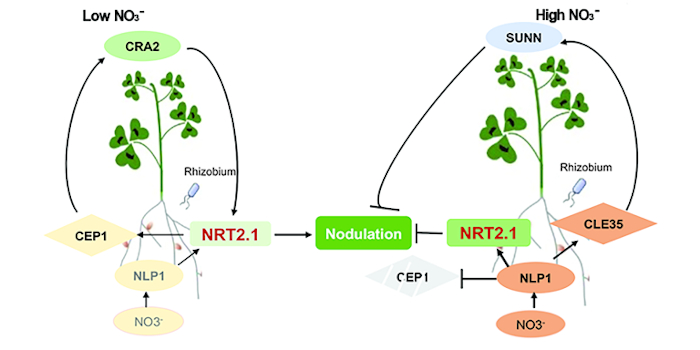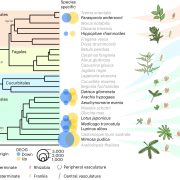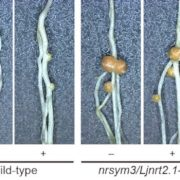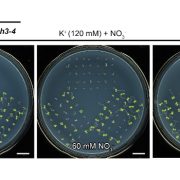MtNRT2.1 controls root nodule formation in response to the ambient nitrate concentration
Luo et al. investigate how nitrate transporters direct root nodule formation in a legume.
By Zhenpeng Luo & Fang Xie
CAS Center for Excellence in Molecular Plant Sciences, Shanghai Institute of Plant Physiology and Ecology, Chinese Academy of Sciences, Shanghai, China.
Background: Nitrogen (N) is an essential nutrient and signaling molecule for plant growth and development. Legume plants can not only use N from soil as nitrate (NO3–), but also obtain N through symbiotic nitrogen fixation with bacteria (rhizobia), which inhabit nodules formed on the plant roots. However, nodule formation and nitrogen fixation are energy-consuming processes for plants; therefore, plants control nodule formation depending on the concentration of available nitrate. High concentrations of nitrate inhibit nodule formation and low concentrations of nitrate promote nodule formation. However, how nitrate controls nodulation remains unclear.
Question: How do the legume nitrate transporters (NRTs) responsible for the uptake/transport of low/high nitrate control root nodule formation in Medicago truncatula?

Findings: Here we report that M. truncatula MtNRT2.1 has both high- and low-affinity nitrate uptake transport activity, and MtNRT2.1 is required for optimal nodule establishment under low nitrate and inhibiting nodulation when nitrate is sufficient. We showed that the transcription factor MtNLP1 directly activated MtNRT2.1 expression and regulation of nitrate uptake under low- and high-nitrate. Under low nitrate, the gene encoding the small peptide MtCEP1 was highly expressed, and the application of this peptide systemically promoted MtNRT2.1 expression in a MtCRA2-dependent manner. MtNRT2.1 is required for the peptide MtCEP1 to enhance nodulation and nitrate uptake. Our study demonstrates that nitrate uptake by MtNRT2.1 differentially affects nodulation under low- and high-nitrate conditions and this is controlled by MtCEP1 and MtNLP1.
Next steps: Soil N uptake and symbiotic N are important for the growth and yield of legume crops, including soybean (Glycine max). Evaluating the conservation of the mechanisms identified in Medicago may provide insight on other legumes in the future.
Zhenpeng Luo, Jiang Wang, Fuyu Li, Yuting Lu, Zijun Fang, Mengdi Fu, Kirankumar S. Mysore, Jiangqi Wen, Jiming Gong, Jeremy D. Murray and Fang Xie. (2023). The small peptide CEP1 and the NIN-like protein NLP1 regulate NRT2.1 to mediate root nodule formation across nitrate concentrations. https://doi.org/10.1093/plcell/koac340








